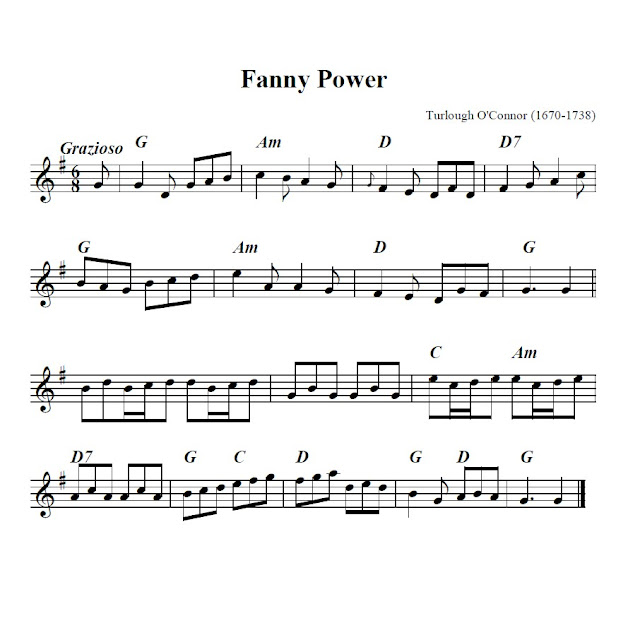An Irish folk song about strong cider sold in Youghal during WW2.
Saturday, December 31, 2011
Wednesday, December 28, 2011
Fanny Power (O'Carolan)
This tune is also called Mrs. Trench. Fanny (Frances) Power was an heiress, daughter of David and Elizabeth Power of Coorheen, Loughrea (for whom Carolan wrote Carolan's Concerto or Mrs. Power). In 1732 Fanny married Richard Trench of Gerbally, County Gallway. The tune was probably composed before her wedding because the second verse (the Gaelic lyrics) Carolan expresses hope he will live to dance at her wedding.
Sunday, December 25, 2011
Wednesday, December 21, 2011
Friday, December 16, 2011
Monday, December 12, 2011
Friday, December 9, 2011
Monday, December 5, 2011
The White Cockade
A cockade is a knot of ribbons, or other circular- or oval-shaped symbol of distinctive colors which is usually worn on a hat.
According to a tradition widely honored in New England, when the colonial militias moved down from Punkatasset Hill to confront the British troops at Concord’s North Bridge on April 19, 1775, they marched to a tune called “The White Cockade.” If indeed they did, it was a bold taunt of defiance. “The White Cockade” was a traditional Scottish tune that celebrated the attempt by “Bonnie Prince Charlie” to reclaim the throne of Britain for the House of Stuart. During the 1745 Jacobite uprising, the Bonnie Prince plucked a white rose and placed it on his bonnet as a symbol of rebellion. Long afterward, the famous Scottish poet Robert Burns recalled the scene with a line of lyrics he set to the tune in 1790: “He takes the field wi’ his White Cockade.”
According to a tradition widely honored in New England, when the colonial militias moved down from Punkatasset Hill to confront the British troops at Concord’s North Bridge on April 19, 1775, they marched to a tune called “The White Cockade.” If indeed they did, it was a bold taunt of defiance. “The White Cockade” was a traditional Scottish tune that celebrated the attempt by “Bonnie Prince Charlie” to reclaim the throne of Britain for the House of Stuart. During the 1745 Jacobite uprising, the Bonnie Prince plucked a white rose and placed it on his bonnet as a symbol of rebellion. Long afterward, the famous Scottish poet Robert Burns recalled the scene with a line of lyrics he set to the tune in 1790: “He takes the field wi’ his White Cockade.”
Thursday, December 1, 2011
Subscribe to:
Comments (Atom)









